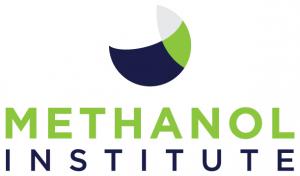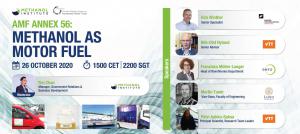
Methanol could be the motor fuel of choice to meet future transport energy demand
Joint Advanced Motor Fuels/Methanol Institute webinar will discuss findings of research into suitability of Methanol as low emission, sustainable motor fuel
WASHINGTON, DC, USA, October 20, 2020 /EINPresswire.com/ -- Methanol could become a cost-efficient, clean and sustainable alternative to fossil fuel in transport, according to a new report* published by the International Energy Agency’s Advanced Motor Fuel (AMF) Technology Collaboration Programme (TCP).As climate change mitigation gains traction around the world, there is a growing need to reduce the greenhouse gas (GHG) emissions of transport. Improving energy efficiency of engines is insufficient, and alternative fuels are required to further improve the environmental performance of different modes of transport.
Renewable transport fuels such as Methanol could become an important solution to combat global warming and air pollution when electrification might face its challenges. The chemical properties of Methanol allow for a more complete and cleaner combustion which lowers pollutive emissions and improves the efficiency of Internal Combustion Engines (ICEs). When produced from renewable pathways, the GHG saving potential of Methanol is considerably high.
Methanol was successfully demonstrated as a motor fuel in the 1980s and 1990s, and there is an ongoing resurgence in interest to utilize Methanol as a fuel in different modes of transport. Today, China is the largest user of Methanol as an automotive fuel and the country has production facilities that can mass produce Methanol vehicles. In Europe, there is growing interest to use Methanol in fuel cell electric vehicles as it is an efficient hydrogen carrier. International shipping is also interested in Methanol as a marine fuel to reduce the environmental impact of the industry. A strong driver of the interest in Methanol as a motor fuel is Methanol engines do not require any special technology. This results in few technical and commercial challenges to the cost-efficient production of Methanol-fuelled vehicles.
The report includes the comprehensive findings of research on Methanol as a transport fuel from its production using both conventional and renewable feedstocks, to its application in ICEs, its advantages and disadvantages as a transport fuel, barriers to market entry, and a suggested outlook on Methanol’s future as a transport fuel.
The findings of the AMF research will be discussed in detail by the Methanol Institute (MI) and AMF in an online seminar to launch the report on October 26, 2020, at 15:00 HRS (CET). It will explore some of the key drivers and triggers to Methanol’s alignment with the energy and climate priorities of today for the automotive industry.
The webinar will feature speakers who are authors of the report from the Danish Technological Institute, German Biomass Research Center (DBFZ), Lund University, and VTT Technical Research Centre of Finland.
To register for the webinar, click HERE.
* The AMF TCP Annex 56 “Methanol as Motor Fuel” report is available for download via this LINK.
About MI
The Methanol Institute (MI) is the global trade association for the methanol industry, representing the world’s leading producers, distributors, and technology companies. Founded in 1989 in Washington DC, MI now represents its members from 5 offices around world in Washington DC, Beijing, Brussels, Delhi, and Singapore. MI serves its members as the voice of the methanol industry, representing companies within the membership to governments and businesses around the world to promote the sustainable growth of the industry. MI focuses on advancing the utilization of methanol as a clean fuel in energy-related applications such as land & marine transport, power generation, fuel cells, industrial boilers, and cook stoves. MI also supports sustainable and renewable process to produce methanol as a carbon-neutral chemical and fuel.
About AMF
The Advanced Motor Fuels Technology Collaboration Programme (AMF TCP) is one of the actors putting transport on track to sustainability and reducing the environmental impacts from transport. Technology Collaboration Programmes are an instrument of the International Energy Agency and support the collaboration of governments and industries from around the world in independent, international groups of experts. Established in 1984, AMF has a strong international network that serves to foster collaborative research, development, and deployment (RD&D) and to provide unbiased information on clean, energy-efficient, and sustainable fuels and related engine and vehicle technology. The mission of AMF is to advance the understanding and appreciation of the potential of advanced motor fuels towards transport sustainability. AMF provides sound scientific information and technology assessments facilitating informed and science-based decisions regarding advanced motor fuels on all levels of decision-making.
Tim Chan
Methanol Institute
+65 9776 3530
email us here
EIN Presswire does not exercise editorial control over third-party content provided, uploaded, published, or distributed by users of EIN Presswire. We are a distributor, not a publisher, of 3rd party content. Such content may contain the views, opinions, statements, offers, and other material of the respective users, suppliers, participants, or authors.




